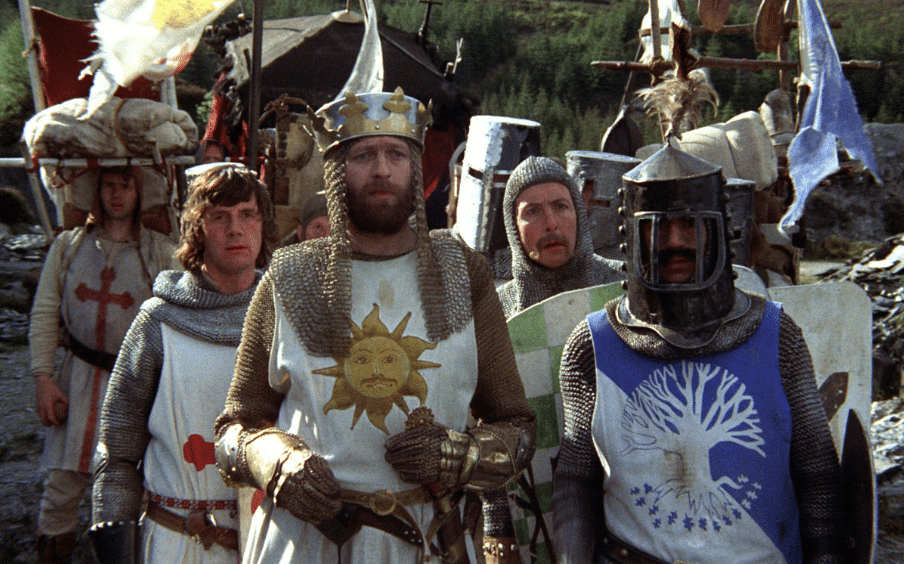The silly season is upon us. While the idea of silliness at Christmas now seems to speak more to panic, stress and drunkenness in the workplace, it has long been baked into the festival’s DNA.
Come midwinter, kings and queens once appointed Lords of Misrule, whose job was to lead the community in revelries and nonsense (Henry VIII loved the tradition so much he also crowned an Abbot of Unreason). At the darkest time of the year, it’s understandable that kings and peasants alike might seek solace in silliness – a deliberate and irreverent casting off of the usual yokes of cares and regulations.
Down under, the weather may be less grim, and the hours of daylight more forgiving, but nothing else seems to be. Rampant inflation is strangling renters and mortgagees alike, climate change is torching the landscape, war is burning on the fringes of Europe, Australia Post is losing everyone’s parcels and COVID is back to have another swipe at cancelling Christmas. Where are our new lords and ladies of misrule to lead us into silliness?
Silliness now lives on the edge of pop culture. When it expresses itself in the mainstream – such as in Apple’s Sprited (a musical reworking of A Christmas Carol starring Ryan Reynolds and Will Ferrell) – it often leans heavily (and knowingly) on the stupid. Ferrell’s back catalogue is packed with similar examples. Films such as Talledega Nights and Blades of Glory are fantastically funny and spectacularly, deliberately dumb.
Not stupid
Silliness is not the same as stupidity. Long after the tradition of the Lord of Misrule was extinguished, it lived on in the colleges of Cambridge and Oxford. There is, perhaps, a reason that much of the silliest and groundbreaking comedians of the television age emerged from those hallowed institutions. Peter Cook. The Pythons. The Goodies. Clever men – and women such as Eleanor Bron – who delighted in being daft.
In his delightful book Silliness: A Serious History, Peter Timms writes that silliness frees us from the ‘tyranny of rationalism’ and is an ‘entertaining way of opening ourselves up to new possibilities’. Silliness isn’t dumb fun but rather the most creative form of humour. Anyone can be clever or cruel – silliness requires a smart and liberated mind.
Timms argues that this liberation is something that has become more important at a time when we demand that art always has to be about something. Pop culture is increasingly judged on its adherence or otherwise to one ideology or another, but silliness might offer relief from the culture wars. Silliness is fundamentally non-conformist, freeing us from existing frameworks that define morality or behaviour and allowing us to see the world from a different perspective. It’s also an irritant to those with cultural or political power, because it means a defiant refusal to take seriously the things we are told we must.
Monty Python’s Flying Circus – a seminal silly text – refused to take anything seriously, from dead parrots to Jesus, and ultimately infuriated the religious right, in much the same way that founding member John Cleese now disappoints the online left.
In serious times, we need people willing to be unserious. People who can embrace misrule and unreason. By giving the gift of nonsense, silliness might actually help us better understand a world that often defies understanding.
Sublimely ridiculous
It’s telling that the news programs that make the most sense are those that should make the least. In 2009, a Time Magazine poll revealed that comedian Jon Stewart was considered America’s most trusted news source. In the UK, satirical programs such as The Mash Report and Have I Got News For You have thrived amid the chaos of our post-Trump, post-Brexit, post-pandemic age.
The latter has endured for more than 30 years because it balances the hard-hitting with the sublimely ridiculous. Ian Hislop (editor of the satirical Private Eye newspaper) is ruthless in his pursuit of sanity, often interrogating panelists – or even guest hosts – for some perceived absurdity. The discomfort this brings is generally eased by the silliness of the opposing team’s captain, Paul Merton. Things are never too serious for too long. He’s the panel show equivalent of a Christmas Cracker – offering a willfully daft diversion that everyone can share and nobody feels insulted by.
Closer to home, Shaun Micallef’s Mad As Hell won’t just be missed for its satire – a form of comedy that is always about something – but for the host’s flights of silliness and his refusal to be serious about serious things.
Read: Shaun Micallef’s Mad as Hell review: a five-star swan song
Satire may have become the dominant form of comedy, but its impact is comparatively limited. In making its particular point, satire can make us think about one thing. Silliness gives us the freedom to think about everything. The pointlessness of silliness is the point. How else are we to face up to the meaninglessness of life in a godless, random and frequently cruel universe other than admit that everything is a bit silly?
Fresh nonsense
Timms may be right that humour-for-humour’s sake has gone out of fashion in some quarters. Comedian Hannah Gadsby used her show Nanette to question the idea that anything is open to being laughed at, or that an artist should be expected to draw on their own trauma for the entertainment of others.
But digital culture has also provided fresh opportunities for outright nonsense, from a tweep programming an AI to write a hymn about ducks, to the kind of frivolous short-form comedy allowed for by YouTube and TikTok – Melbourne’s Aunty Donna being an example of absurd-but-smart comedians who have made the leap from the digital to the terrestrial.
Read: Aunty Donna score their first narrative comedy series for ABC
At its heart, silliness is play. No doubt this is why children are still creased in mirth by M. Hulot’s kayak becoming a crocodile or The Goodies taking a surreal trip to the local gym. It may not be taken seriously (it may not even want to be), but silly comedy is eternal in a way that satire, by its nature, can never be.
Like Christmas, it offers a chance to reconnect with the freedom of childish unreason. If we ever cease to find silly things funny, maybe the problem is not with them, but with us.





